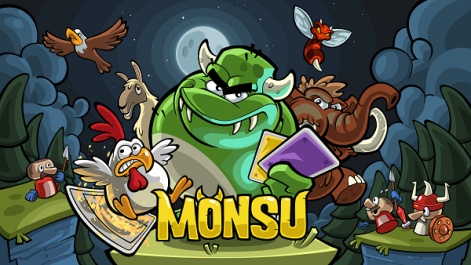In the build up to Pocket Gamer Connects Helsinki 2015 - which runs from 7-8 September 2015: get your tickets here - this week, we're looking back over the history of the Finnish mobile games industry.
You can read the full set here.
In the space of 20 years, the Finnish games scene has evolved from a collection of hobbyist into the home of a world leading mobile gaming industry worth billions of dollars.
But while the likes of Supercell and Rovio have established their position as leaders in the field, the question is whether Finland will remain ahead of the curve.
Full of talent as it is, can a country of barely 6 million continue to punch above its weight?
While it is notoriously difficult to make predictions, the current state of the industry and the history of mobile gaming in the country so far suggests that the Finns will remain at the forefront.
The combination of a deep talent pool, seriousness about the value of mobile gaming and remarkable inter company co-operation marks Finland out as a country well placed to continue to produce talent.
The antithesis of the super competitive, "pick it up and throw it away" culture of Silicon Valley and its lesser offshoots, Finland is a serious but friendly hub that is well suited to thriving in the mobile economy.
Growing up
The previous parts of this history have looked extensively at the minutiae of the development of the Finnish mobile gaming scene, drilling into the stories of individual companies as they have emerged.
Yet if we take a look at the bigger picture over the period, then a number of obvious trends exist which have helped Finland to develop as a hub for development talent and mobile gaming as a whole.
The first is the role that the state has played in educating and supporting talent in Finland.
Speaking to Matthew Wilson, senior publishing manager at Rovio, he described the Finns as "seriously smart guys", something which is directly a result of a well funded and extensive education system.
The basis of the industry emerged from the Demoscene subculture that grew out of the 1980s into the 1990s.
With extensive schooling available across the country, no tuition fees for students and high pay for teachers, the country has propelled itself to the top of the UN's Human Development Index alongside Denmark and Australia.
Helping hand
Alongside this high quality education, real financial support provided by the government for the mobile gaming industry has helped to sustain and grow the industry.
The government non-profit investment organisation Tekes has been providing funding and interest free loans for the Finnish technology sector to the tune of €550 million in 2014. If you're a talented developer in Finland, then it seems you have real opportunities to benefit from the state in a number of ways.
Yet this isn't an industry propped up by the state alone. A groundswell of talent that founded the basis of the industry emerged from the Demoscene subculture that grew out of the 1980s into the 1990s.
Celebrating the achievements of developers capable of squeezing the most out of technically limited devices, the scene has grown into a full on movement under the Assembly banner that consistently pumps out talent into the industry and provided the basis for those early mobile pioneers to succeed even on the most limited of devices.
Even today, that subcultural attitude remains important for the development of games. Harri Granholm, creative director at Grand Cru, says it has shaped their team's creative approach when making games.
"They need that challenge and that extra challenge to create something new and create something better feeling and better than others" he said
"It's something that has come from the demo scene background about trying to do something cooler and do something better than people." More than just a movement, the demoscene has curated a state of mind in the Finnish mobile gaming industry that seeks to squeeze the very last drop out of the devices being developed with.
Beyond the role of cultural movements, private commercial support played an important part in the construction of the industry talent. Nokia's role in supporting the growth of the industry helped to keep the boat afloat prior to the arrival of the iPhone or wider governmental support.
The handset manufacturer's close relationship with developers who created titles in Finland helped to finance companies to an extent that they could grow and endure the dark days of the mobile operator dominated economy.
Developers like to share ideas and share their games early on, which helps you to make really great games.Teemu Huuhtanen
Ultimately, the Finnish mobile gaming industry evolved into the industry we see today because the combination of a good education with private or public investment helped developers who had the mindset cultivated by a subcultural movement to build quality mobile games to succeed.
Co-op mode
But it did something else too: it helped to create a tight knit community around mobile gaming. By fostering this community and helping it grow, talented individuals and companies have driven the industry to new heights.
Teemu Huuhtanen is the CEO of Next Games, a Finnish gaming company founded in 2012 who are in possession of the licence for The Walking Dead TV show. He says that not only is there serious talent in the Finnish industry, there is a community element that drives others on to the next level.
"It's an open culture here in Helsinki where developers like to share ideas and share their games early on to get really good feedback which helps you to make really great games as you realise you have really great competition" he said.
It's an opinion that is shared by Antti Sten, founder and CEO of Boomlagoon. When discussing the maturing of the industry, says community was an important element.
"We have maturity on the community side," he said and he elucidated further by describing how close the different companies are.

"We don't heavily compete with each other - we just happen to be making different games and working in different companies."
As a result of this, the talent found across the industry in Finland has ended up helping to spur each other on. With many of the leading figures intertwined during the early days of the industry and co-operating on projects, it has helped to lead to the formation of many a company.
This includes Huuhtahnen's Next Games. "The company was officially kicked off in May 2013 and what happened before that is [co-founder] Joakim and I go way back," he says.
Elaborating on the story further, he comments "I founded my first company back in early 2000 and was a programmer. Then we went our separate ways and he founded his own mobile gaming startup and then we worked in different places."
"Later on when we were thinking of working together. He was at Supercell and I was with Rovio, so we saw that part of the business from a different perspective. So when we wanted to go back into the business, we thought about how to get the best talent to work for ourselves."
Going their own way
In short, co-operation ties together much of the industry and a commitment to only working with the best drives each team on. That leads to the creation of some truly unique approaches to the way that the industry works, with greater emphasis on companies exploring maturing trends.
We want to make sure we take good care of the people who play our games.Teemu Huuhtanen
For Boomlagoon, their focus is on the construction of character within the mobile sector. "We were founded in 2012 with the aim of creating character driven games on mobile," Sten said when discussing the company's objectives.
"It's something missing on the mobile gaming scene. By building background stories and a broader world, we make a window into the magical world of characters and stories. It's not all about game mechanics."
At the same time, Next Games are outlining their own consumer-oriented approach to mobile gaming. Discussing his company's approach, Huuthanen says, "One of our values is caring. We want to make sure we take good care of the people who play our games and that they don't go and spend all of our savings on our games."
Contrasting sharply with the whale driven narrative focus of many companies, Next Games approach shows a refreshingly positive and unique attitude towards the consumer. And it is the unique element that seems to run through Finnish gaming.
Saara Bergstrom, Next Games' head of marketing and communication, identified it as crucial to the other Finnish success stories.
"If you think of the games companies and existing companies like Supercell, Remedy and Rovio, each company has chosen their own path and I haven't really seen these companies have the same path," she says.
"It's really good for the players and the market that these companies exist and go their own way."
It is something that Granholm from Grand Cru agrees with. When it comes to the design of their games, the approach is based upon building something their team is capable of doing.
"The games we make look like us" he elaborates".
"It doesn't work if you try to shoehorn something or some model into the team and it doesn't work. We have built the team and we do at the same time and we've got certain types of people to do this and the most reasonable thing to do."

It is a sentiment that is hard to disagree with.
By focusing on their own approach and taking their route, companies such as Boomlagoon, Grand Cru, Next Games, Seriously and more recent startups like Everywear, Koukoi and Futureplay are establishing another wave of leading Finnish titles not by simply copying what has gone before - but by evolving and constructing new experiences to offer players something new and exciting within the mobile space.
Onwards and upwards
It is perhaps that which helps explain why Finland remains so well placed to continue to be successful.
Brimmed with talent looking to build the great next set of experiences, the talent that has been incubated with the help of funding, education and sub-culture has blossomed into a mature sector that actively looks for the best new approaches independently.
Finnish developers remain willing to push the boundaries while retaining quality at their heart.
Rather than relying on others to make the leap forward or taking a fad based approach to their next product, Finnish developers remain willing to push the boundaries while retaining quality at their heart.
While the majority of developers will take on board the lessons of others, the industry in Finland doesn't simply copies others; it takes their lessons and build upon it with their own thoughts and approaches.
That's why the future is bright for Finnish developers. Of course, there is plenty of money flowing in from external sources, there are plenty of great developers but the really important issue is that mature mentality and outlook.
With the emphasis on business construction, building great games and honest review of their work from peers, the Finnish mobile gaming community has the perfect mixture of competition, friendliness, criticism and praise to foster a healthy atmosphere that creates positive rivalry.
"We're competitive in a brotherly way" Granholm says.
And if that isn't a recipe for future success in the mobile gaming industry, or any industry in the world for that matter, then nothing else will be.






















